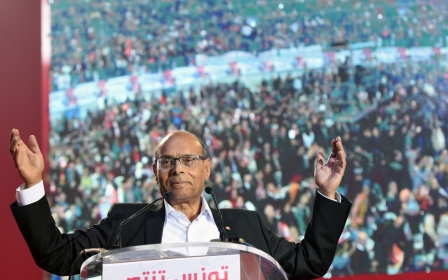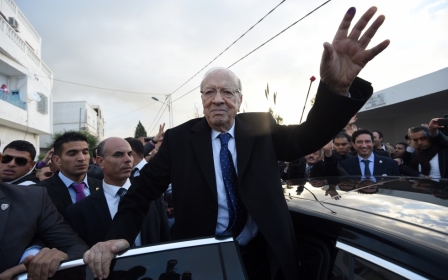Tunisia's Essebsi vows to 'turn page' as world leaders hail vote

Tunisia is “turning the page on the past,” its newly-elected 88-year-old President Beji Caid Essebsi said late on Monday, hours after election results were finalised.
"I am for completely turning the page on the past, we must go beyond the past and look to the future," said Essebsi who served as a prime minister under former ousted strongman Zine El Abidine Ben Ali, but has since striven to reinvent himself.
The presidential vote - the first time Tunisians have freely elected their head of state since independence in 1956 - was seen as a milestone for the country that sparked the Arab Spring with the 2011 ouster of Ben Ali.
The European Union congratulated the veteran politician on his victory, hailing the vote a "historic" milestone on the country's path to democracy.
"Tunisians have written a historic page in the country's democratic transition," EU foreign policy chief Federica Mogherini said in a statement, adding that the 28-member bloc was committed to working with the new Tunisian authorities.
US Secretary of State John Kerry also praised the vote, calling Tunisia a “shining example to the region and the world”.
“Tunisia’s achievements this year lay the groundwork for a more stable, prosperous, and democratic future for the country,” Kerry added.
President Francois Hollande of France, Tunisia's former colonial ruler, likewise praised Tunisians for their "determination, sense of responsibility and spirit of compromise".
Essebsi won with 56 percent of the vote, while his rival and now outgoing president Moncef Marzouki secured 44 percent. According to the Tunisian election watchdog, Mourakiboun, turnout was 60 percent.
While some politicians had called on Tunisians to cast a blank vote in protest, Mourakiboun estimated that no more than 1 percent left their ballots blank, with an estimate of 1.5 percent to 1.7 percent of overall ballots being ruled invalid.
While Marzouki’s camp originally complained of irregularities and refused to concede defeat before the official tally was released, he later appeared on national television and urged for calm, calling on his supporters to return in their homes "in the name of national unity".
"These are the rules of the democratic process," he said.
The Ennahda party, which was in power after the revolution and installed Marzouki as president, came second in the general election and has not ruled out joining in a governing coalition. It is usually seen as Tunisia’s branch of the Muslim Brotherhood but grew out of very specific local circumstances and is seen as less dogmatic, and has been hailed for trying to compromise with political rivals since 2011.
Various regional leaders were also quick to congratulate Essebsi with Egypt’s Abdel Fattah al-Sisi, saying that the Tunisian people had instilled a “precious confidence” in the new leader.
Moroccan King Mohammad VI also welcomed the results, saying Essebsi’s election would bolster the "democratic path" in the country.
The election "manifests the Tunisian people's will to press ahead on the path of bolstering democracy and completing institutional reforms toward a prosperous future," he said.
The so-called Arab Spring began in Tunisia in December 2011 when Mohamed Bouazizi a street vendor self-emulated to protest corrupt and oppressive local government policies. His death quickly sparked widespread protests that soon led to President Ben Ali’s ouster in mid-Jan.
The wave of protests then swept to Egypt, where popular and largely non-violent demonstrations managed to overthrow longtime strongman Hosni Mubarak, before spreading to other parts of the Middle East and North Africa.
A counter-revolutionary wave, however, has since swept through many of the so-called Arab Spring countries, with many experiencing prolonged periods of uncertainty, violence and even civil war.
Stay informed with MEE's newsletters
Sign up to get the latest alerts, insights and analysis, starting with Turkey Unpacked
Middle East Eye delivers independent and unrivalled coverage and analysis of the Middle East, North Africa and beyond. To learn more about republishing this content and the associated fees, please fill out this form. More about MEE can be found here.




